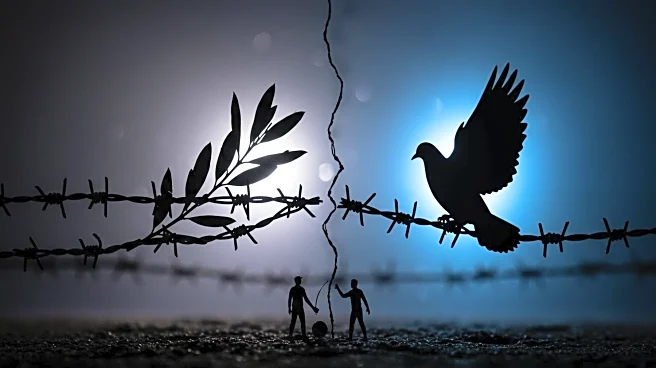What's Happening?
The ongoing conflict in Gaza has led to a significant divide among Jewish Americans regarding the humanitarian crisis and Israel's military actions. Heartbreaking images of starving children in Gaza have intensified debates within the community. Some Jewish Americans are critical of Prime Minister Benjamin Netanyahu's handling of the war, while others maintain strong support for Israel, citing Hamas as the primary obstacle to humanitarian aid. The United Nations reports that nearly 1,400 people have been killed and over 4,000 injured in Gaza due to food distribution chaos. The Gaza Humanitarian Foundation, backed by American and Israeli interests, has been criticized for its role, with accusations against Hamas for exacerbating the violence. Jewish synagogues across the U.S. are hosting discussions to address these concerns, reflecting a deepening rift within the community.
Why It's Important?
The division among Jewish Americans over the Gaza crisis highlights broader implications for U.S. foreign policy and domestic social dynamics. The conflict has sparked debates about moral responsibility and the role of the U.S. in international humanitarian efforts. Jewish organizations and leaders are grappling with the ethical challenges of supporting Israel while addressing humanitarian needs in Gaza. This internal conflict could influence U.S. political discourse and policy decisions, particularly regarding military aid to Israel and diplomatic strategies in the Middle East. The situation also underscores the potential for increased polarization within American society, as differing views on the conflict may affect community relations and political alignments.
What's Next?
As the humanitarian crisis in Gaza continues, Jewish American communities are likely to engage in further discussions and advocacy efforts. The pressure on the U.S. government to intervene and address the chaotic food distribution in Gaza may increase. Jewish organizations may continue to host roundtables and forums to explore solutions and bridge divides within the community. The ongoing violence and humanitarian challenges could lead to shifts in public opinion and policy, potentially affecting U.S.-Israel relations and broader Middle East diplomacy. Stakeholders, including political leaders and civil society groups, may need to navigate complex ethical and strategic considerations in response to the evolving situation.
Beyond the Headlines
The conflict in Gaza and the resulting division among Jewish Americans may have long-term cultural and ethical implications. The debates over humanitarian aid and military actions raise questions about the moral obligations of communities and nations in times of crisis. The situation could lead to a reevaluation of Jewish identity and values, particularly concerning peace and justice. Additionally, the conflict may influence interfaith relations and dialogues, as communities seek to address the humanitarian needs while maintaining cultural and religious solidarity. The ethical dilemmas faced by Jewish Americans could resonate beyond the immediate crisis, shaping future discussions on global humanitarianism and conflict resolution.









